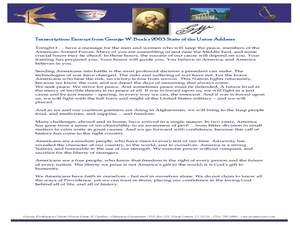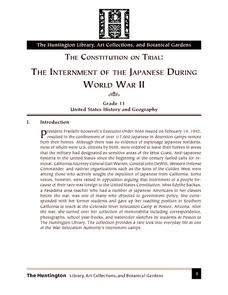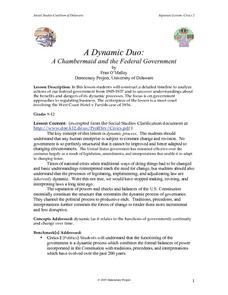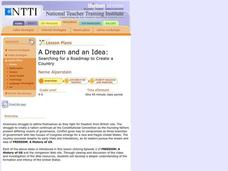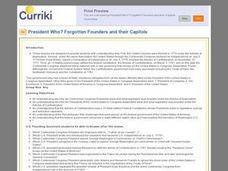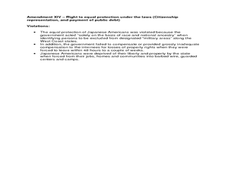Curated OER
Civil War and Reconstruction
Fourth graders investigate the Civil War by researching the state of Virginia. In this US History lesson, 4th graders identify Abraham Lincoln, James Chestnut and Fort Sumter, and discuss their roles in the start of the Civil War. ...
Foreign Policy Research Institute
Understanding China: The Prospects for Democracy in China
This document provides useful information for a unit on democracy in China. While it does not include detailed activities, it does have a list of democratic principles, and important facts about China that facilitate understanding of its...
Curated OER
Search and Seizure: What Does It Mean?
Students, in a juvenile correctional facility, study the meaning of the Fourth Constitutional Amendment. They study definitions and complete worksheets to investigate the implications of the amendment.
Curated OER
A Time for Justice
Pupils engage in a lesson that focuses on the development of The Bill Of Rights in the United States. They conduct research using a variety of resources. Students two focus questions in order to guide the information search. They state...
Curated OER
An Early Threat of Secession: The Missouri Compromise of 1820 and the Nullification Crisis
Students analyze an interactive map of the Missouri Compromise to identify the regions and their relation to slavery. In this pre-civil war era lesson, students read primary source documents and research online to answer questions...
Curated OER
Tally of the 1824 Electoral College Vote
Twelfth graders study the parts of the Constitution that address presidential election. They complete a variety of activities designed to spark debate about the flaws in the Electoral College system.
Curated OER
Gun Control and Terrorism: Laws or Loopholes?
Students examine the Second Amendment of the Constitution. They research and organize key arguments and other fundementals of gun control. They participate in a debate defending the wording of the Second Amendment.
Curated OER
Checks and Balances in Supreme Court Nominations
Young scholars discover the system of Checks and Balances related to recent events prompting action by one or more of the three branches of government. They study the process for selecting and confirming a Supreme Court justice. They...
Curated OER
George Washington's Foreign Policy
Learners compare George Washington's foreign policy to the policies of presidents who followed him. In this primary source analysis lesson, students compare Washington's Farewell Address to the Roosevelt Corollary, the Monroe Doctrine,...
Curated OER
Alexander Hamilton and the Roots of Federalism
Explore the origin of political parties in the United States. Learners work in groups to read and analyze copies of the "Report on Manufactures" written by Alexander Hamilton. Then, they complete a worksheet comparing the Federalists to...
National Endowment for the Humanities
George Washington: The Precedent President
Everyone knows that George Washington was the first president, but do your scholars know why that was so important? The lesson plan, the third in a sequence of three, allows learners to understand how George Washington set a precedent...
Constitutional Rights Foundation
Educating About Immigration The DREAM Act
Group members role play state legislators, supporters of and opponents to the The DREAM Act (Development, Relief, and Education for Alien Minors). After listening to the arguments put forth for and against the immigration legislation,...
C-SPAN
14th Amendment Equal Protection Clause
Two Supreme Court cases, Plessy v. Ferguson and Brown v. Board of Education take center stage in a lesson about the Equal Protection Clause of the 14th Amendment. Class members research both cases to compare and contrast the rulings.
Curated OER
The Constitution on Trial: The Internment of the Japanese During World War II
Eleventh graders analyze primary source documents during the Second World War. Students recall statements of Japanese-Americans who were placed into internment camps during the war.
Curated OER
A Dynamic Duo
Students engage in the research of history that surrounded the actions of the federal government during the years from 1907-1937. The focus of the lesson is upon the regulations imposed on business during the time and how it effected the...
Curated OER
A Dream and an Idea: Searching for a Roadmap to Create a Country
Students compare and contrast opposing visions of government held by the founding fathers. They evaluate the roles of historical leaders in shaping the U.S. as an emerging nation.
Curated OER
All Men Are Created Equal
Learners discuss the statement "All Men Are Created Equal". Using the internet, they research events in history in which this statement has been ignored and supported by the government. They use this information to write an essay about...
Curated OER
The Invasion of Iraq
Students explore the war in Iraq. They use videos, newspapers, and other media to examine the circumstances leading up to the invasion, the war's major battles, and the post-war situation on the ground. Students read letters from Iraq...
Curated OER
State Symbols
Third graders examine the symbolism of the United States by observing different flags. In this U.S. History lesson, 3rd graders utilize the Internet to research state seals, flags, and other symbols that represent specific areas of our...
Curated OER
President Who? Forgotten Founders and Their Capitols
Students explore the beginning of the United Colonies that were formed in 1774. In this history lesson, students discuss the Articles of Confederation and then answer questions about the events surrounding the development of the colonies.
Curated OER
Marching For Freedom
Students appreciate the sacrifices that people from across the country made to ensure that all citizens could exercise their constitutional right to vote. They access excellent websites and documents imbedded in this plan to guide their...
Curated OER
Understanding Treaties: Students Explore the Lives of Yakama People Before and After Treaties
Students analyze treaties made between the US government and Native American tribes. For this government lesson, students evaluate bias emotionally connect with what was gained and lost during the late 1700's. This is a 3 part lesson...
Curated OER
The Bill of Rights And Japanese Internment
Learners review the Bill of Rights. They interpret how the American Government violated these rights with regard to Japanese Americans during World War II. They write down the violations of the Bill of Rights during Japanese ...
National Endowment for the Humanities
Slavery and the American Founding: The "Inconsistency Not to Be Excused"
High schoolers examine slavery in the revolutionary and colonial eras of the United States. In this slavery lesson, students investigate the presence of slavery in early America, the language of the Constitution, and the intent of the...










